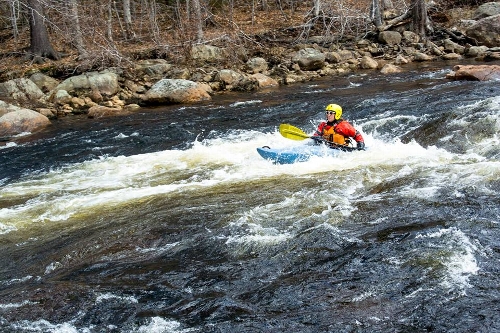The sport of whitewater paddling cannot exist without rivers and rapids to
play on, for this reason, many commercial paddlers (rafting guides) and recreational
paddlers are involved in river advocacy. River advocates protect the natural flow of a river
and restore rivers that have been anthropologically affected. They prevent the construction
of dams, create legislation to prevent excess diversion of water, require old dams to be torn
down, and clean rivers that were polluted. One group called American Rivers, based out of
Washington D.C., works to clean rivers and change legislation regarding dam building and
dam operations. Their website claims that American Rivers had a hand in the removal of
over two hundred dams in America, seventy‐two just in 2014! (americanrivers.org).
The organization, American Whitewater (AW) has the most useful resources for
paddlers and is also a world famous river advocate. The organization has acted as a legal
advisor for many companies and river managers. Although AW is better known for its
databases on safety and river ratings, it was created as a river advocacy group to protect
and restore rivers, and has advocated for the removal of over 100 dams
(americanwhitewater.org).
AW works with the federal and state governments to restore rivers that were
polluted or diverted and to protect rivers before this happens to them. River advocacy
would be useful in Colorado for the Colorado River because the river no longer reaches the
ocean. The state legislation in Colorado used to hold that if you own the land along a river,
you own that stretch of the river as well. People diverted the water in the river for their
farms and there were no regulations, since it was personal property, not state property
(Helton).
The legislation in New York State, on the other hand, designates waterways as
public land. Paddlers in New York have the right to paddle on any waterway, and there are
more regulations on the water, which is public property. Paddlers must still be wary
because private property lines along riverbanks only extend to the low water mark. So, if a
paddler goes onto a riverbank that is privately owned, he or she is trespassing (Connelly).
The Moose River in the Adirondacks provides entertainment and challenges for
many paddlers, and its history brings AW’s river advocacy closer to home. The river has
some beautiful Class II and III rapids with stretches of flat‐water between. American
Whitewater helped Adirondack paddlers when they fought to save the Moose River from a
hydroelectric power company from 1978 to 1984 (Skinner). AW negotiated with the
company to move the location of the dam downriver from the stretch of river most popular
with the paddlers so that the rapids would be unaffected. AW also convinced the company
to schedule the dam releases every 20 days so paddlers knew when the river would rise.
Their legal success and experience with river advocacy for the Moose RIver prepared them for their fights against
other dams. Every year there is a festival for paddlers on the most popular stretch of the
Moose River to celebrate the rapids that weren’t dam(n)ed.
Dams are not as much of a threat for paddlers anymore, due to a law passed by
Congress in 1986, around the same time as the Moose River decision came out. The law,
called the Electric Consumer Protection Act, requires dam companies to have regularly
scheduled whitewater releases in addition to other requirements that protect the
environment (Lessels).
"About Us." American Rivers. Web. 24 Feb. 2015.
"Mission." American Whitewater. Web. 24 Feb. 2015.
Connelly, John. Appalachian Whitewater: The Northern States. Birmingham, Ala.: Menasha
Ridge, 1999. Print.
Helton, Cory. "The Right to Float: The Need for the Colorado Legislature to Clarify River
Access Rights." University of Colorado Law Review 83 (2012): 84573.
Lawreview.colorado.edu. Colorado University Law School. Web.
Lessels, Bruce. Classic Northeastern Whitewater Guide. Boston, MA: Appalachian Mountain
Club, 1998. Print.
Skinner, Pete. "The Tale of Two Rivers The Moose and the Black." American Whitewater
XXXI.4 (1986): 2628. Print.

![tiy, photo of Agers Falls “dam below” sign on the Moose from http://www.kayakdiaries.com/2011/10/19/the-mighty- moose/]](/assets/mmlibrary/images/large/unnamed.png)
